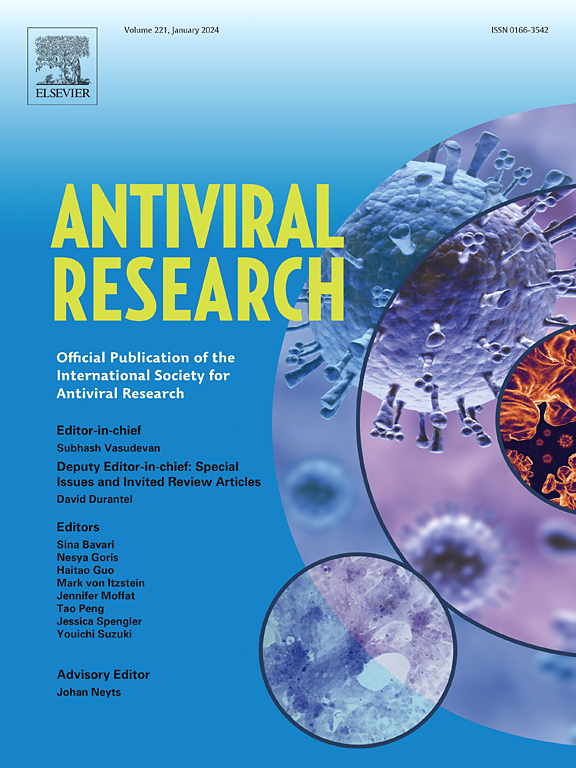银杏酸通过破坏核蛋白与VP30蛋白的相互作用抑制埃博拉病毒的转录和复制。
IF 4.5
2区 医学
Q1 PHARMACOLOGY & PHARMACY
引用次数: 0
摘要
埃博拉病毒是一种丝状病毒,自被发现以来,已造成大量人类死亡。尽管研究广泛,但由于其复杂的发病机制,有效的小分子药物仍然难以捉摸。抑制RNA合成是一个很有前景的治疗靶点,VP30蛋白在这一过程中起着关键作用。VP30与核蛋白(NP)之间的相互作用对病毒复制至关重要。我们确定银杏酸是一个对VP30具有强亲和力的小分子,并通过热移、表面等离子体共振、荧光偏振、下拉和共免疫沉淀等多种实验验证了这一结论。银杏酸在EBOV转录和复制能力强的病毒样颗粒(trVLP)系统中具有抗病毒效果。此外,我们解析了VP30-银杏酸配合物的晶体结构,揭示了位于VP30/NP相互作用界面的两个银杏酸分子。这些结构信息提供了银杏酸抗病毒活性的分子基础,并提出了一种针对VP30/NP相互作用的新治疗策略。本文章由计算机程序翻译,如有差异,请以英文原文为准。
Ginkgolic acid inhibits Ebola virus transcription and replication by disrupting the interaction between nucleoprotein and VP30 protein
The Ebola virus, a filovirus, has been responsible for significant human fatalities since its discovery. Despite extensive research, effective small-molecule drugs remain elusive due to its complex pathogenesis. Inhibition of RNA synthesis is a promising therapeutic target, and the VP30 protein plays a critical role in this process. The interaction between VP30 and the nucleoprotein (NP) is essential for viral replication. We identified ginkgolic acid as a small molecule with strong affinity for VP30, which was validated through multiple assays, including thermal shift, surface plasmon resonance, fluorescence polarization, pull-down, and co-immunoprecipitation. The antiviral efficacy of ginkgolic acid was demonstrated in the EBOV transcription- and replication-competent virus-like particle (trVLP) system. Furthermore, we resolved the crystal structure of the VP30-ginkgolic acid complex, revealing two ginkgolic acid molecules located at the VP30/NP interaction interface. This structural information provides insight into the molecular basis of ginkgolic acid's antiviral activity and suggests a novel therapeutic strategy targeting the VP30/NP interaction.
求助全文
通过发布文献求助,成功后即可免费获取论文全文。
去求助
来源期刊

Antiviral research
医学-病毒学
CiteScore
17.10
自引率
3.90%
发文量
157
审稿时长
34 days
期刊介绍:
Antiviral Research is a journal that focuses on various aspects of controlling viral infections in both humans and animals. It is a platform for publishing research reports, short communications, review articles, and commentaries. The journal covers a wide range of topics including antiviral drugs, antibodies, and host-response modifiers. These topics encompass their synthesis, in vitro and in vivo testing, as well as mechanisms of action. Additionally, the journal also publishes studies on the development of new or improved vaccines against viral infections in humans. It delves into assessing the safety of drugs and vaccines, tracking the evolution of drug or vaccine-resistant viruses, and developing effective countermeasures. Another area of interest includes the identification and validation of new drug targets. The journal further explores laboratory animal models of viral diseases, investigates the pathogenesis of viral diseases, and examines the mechanisms by which viruses avoid host immune responses.
 求助内容:
求助内容: 应助结果提醒方式:
应助结果提醒方式:


